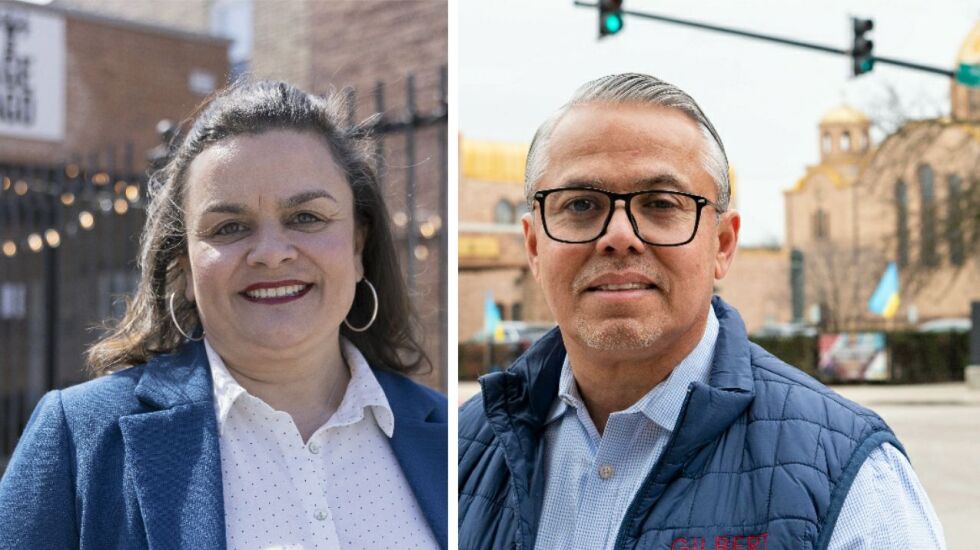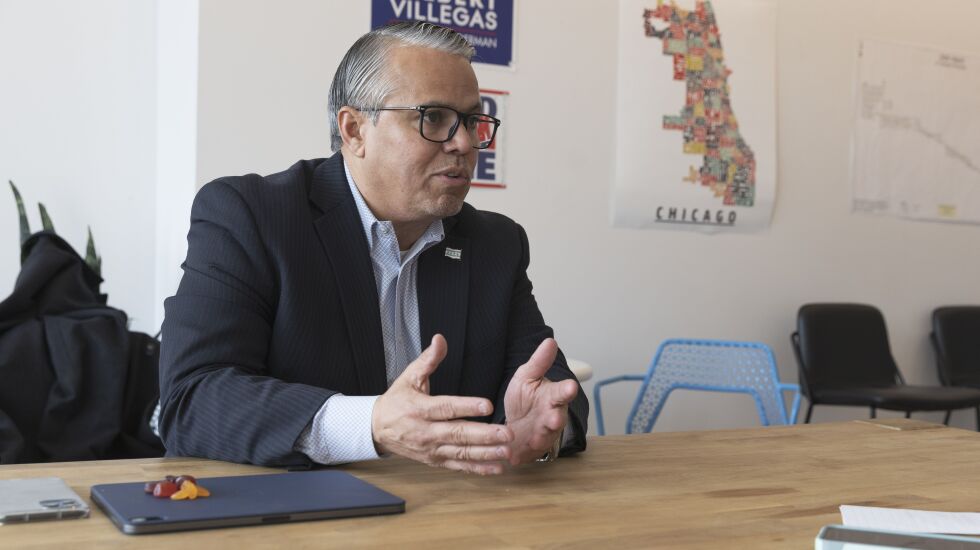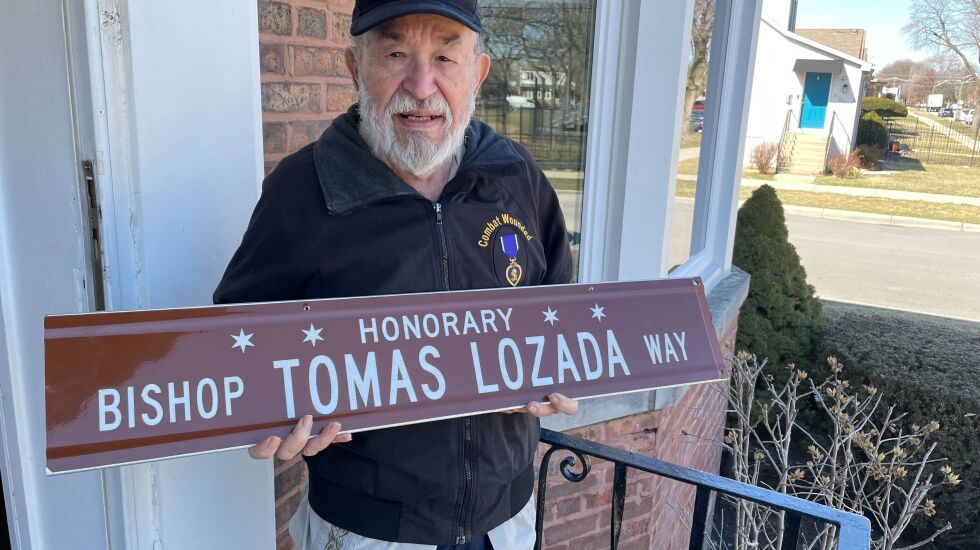
When Lori Torres Whitt saw how the 36th Ward was oddly redrawn to include more than a handful of communities in a strip stretching about eight miles from West Town to Montclare, it pushed her to take the plunge and run for the City Council.
“If you’re in office representing the people here, how do you let this happen?” Torres Whitt asked. “And if you let this happen, what else are you letting happen?”
Torres Whitt, 49, of West Town, is challenging Ald. Gilbert “Gil” Villegas, 52, of Dunning, who is seeking a third term in the City Council. They were thrown into a runoff April 4 after neither was able to secure the majority of votes in February.
Villegas received about 46% of the votes in the Feb. 28 election, Torres Whitt about 30%.
In total, more than 57,000 Chicagoans live in the 36th Ward, and a majority — nearly 56% — identify as Latino, according to city data. Less than 10,000 voters cast ballots during the Feb. 28 election.
The newly redrawn ward stretches from Sayre Avenue in the Northwest Side’s Montclare neighborhood across parts of the West Side to Wood Street in West Town. Along the way, the ward that was described as a “pool noodle” picks up parts of Ukrainian Village, Humboldt Park, Dunning and Belmont Cragin.
Houses it contains vary from bungalows with front lawns to multi-story buildings. Some streets are lined with Ukrainian flags while other residents fly Puerto Rican flags.
Villegas was first elected in 2015, and he at one point served as Mayor Lori Lightfoot’s Council floor leader. He is also the chairman of the chamber’s Latino Caucus. Last year, he unsuccessfully ran for Congress.

Villegas touts his experience in government as one of the reasons why voters should give him another term, pointing out that City Hall will be in a state of transition.
“We want to make sure that we have a City Council, and members that are experienced,” he said. “We can’t afford on the job training. I want to make sure the work that I’ve done thus far continues.”
‘I do the work’
Torres Whitt is a teacher at Monroe Elementary School, and she’s also part of the Chicago Teachers Union’s executive board. The union endorsed Torres Whitt, and the CTU Local 1 PAC is one of the biggest financial contributors, according to Reform for Illinois.
Torres Whitt argues that her experience as an educator, community organizer and labor advocate prepared her for the job.
“If you want someone who is looking for making progress in the 36th Ward and in Chicago, that’s me,” she said. “I don’t claim I’m progressive, I am because I do the work.”
Villegas said he won’t endorse a candidate for mayor. Torres Whitt backs Cook County Commissioner Brandon Johnson.
Torres Whitt and Villegas do share some commonalities.
Villegas also opposed how the ward was redrawn, saying it resembled a “snake,” which he said at the time was fitting because his colleagues who drew it were “self-portraits of snakes,” stabbing him in the back.
“The redistricting process is very contentious,” Villegas said during a recent interview. “But nonetheless, at the end of the day, I got an opportunity to represent the 36th Ward, I’m picking up new residents. And the funny part is that I’m originally from West Town so this is in essence just bringing me back to where I started at.”
Both said multiple ward offices will be needed to accommodate residents who live on opposite ends. Villegas and Torres Whitt support the City Council — rather than the mayor — appointing committee chairs.
The two also agree on efforts such as Bring Chicago Home, which aims to raise taxes on the sales of properties of $1 million or more to generate funds for services for the unhoused population.

The candidates differ on issues such as policing. Villegas said he supports reopening the old Wood Street District police station or using the facility as a satellite office. The property sits at the border of the 36th Ward, but is within the 1st Ward.
“There’s a correlation between the closure of this police district a decade ago and the uptick in crime in the West Town, East Town, Ukrainian Village area,” Villegas said.
Torres Whitt sees a correlation between the city’s shuttered mental health facilities and crime. She said she is in favor of investing in mental health programs and those aimed at the youth.
“We live in Chicago that invests a lot in safety, and yet no one feels safe,” she said. “Let’s add the tools that officers need so that they can do the work they are trained to do.”
‘It’s grass, it’s curbs, it’s sidewalks’
Voters have their own concerns.
Belmont Cragin resident Angel Roque said he would like to see better communication and improvements on infrastructure projects. He points to an area in front of his single-family home where grass was torn up to make way for meters.
“It’s grass, it’s curbs, it’s sidewalks,” said Roque, 49, who was undecided about his vote. “We can only do so much to try to enhance our neighborhood, make it look better. But the other part seems to be a forgotten area.”
In Montclare, Tomas Lozada, 90, said he planned to back Villegas for another term, and he would like more activities for military veterans such as himself. He recently moved in with his granddaughter after having to leave his senior home because of its conditions.

His granddaughter, Irma Cornier, 45, was undecided, but she would also like to see improvements around her neighborhood, pointing out potholes in a nearby park.
“How come basic stuff like that isn’t fixed,” asked Cornier, who ran for another ward’s Council seat eight years ago.
Cornier would also like to see more programs for veterans and a way to memorialize her grandfather’s 65th Infantry Regiment, a storied branch of Puerto Rican soldiers.
On the other end of the 36th Ward in West Town, Zia Nix, 39, said she supports Torres Whitt because her politics aligns with hers. She would like to see more social services address mental health and poverty.
But she’s also concerned about redistricting that put her in the 36th Ward.
“Are they going to be able to address these issues?” Nix asked, as she walked her dogs, Burnham and Basil. “It just seems like it’s not really to our advantage the way that they’re being redrawn.”
Elvia Malagón’s reporting on social justice and income inequality is made possible by a grant from the Chicago Community Trust.







